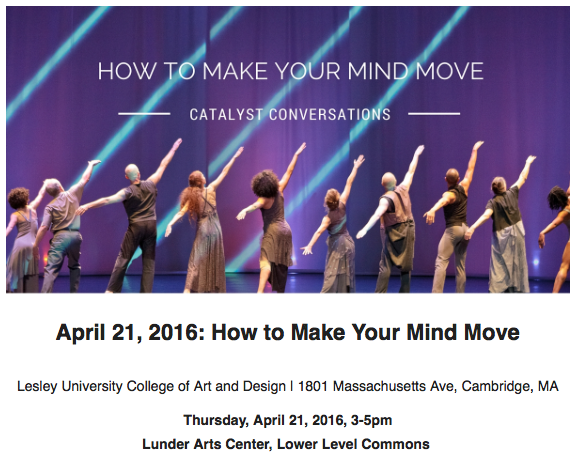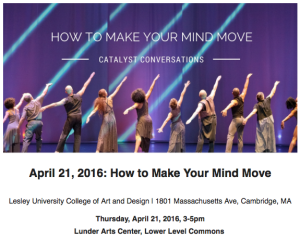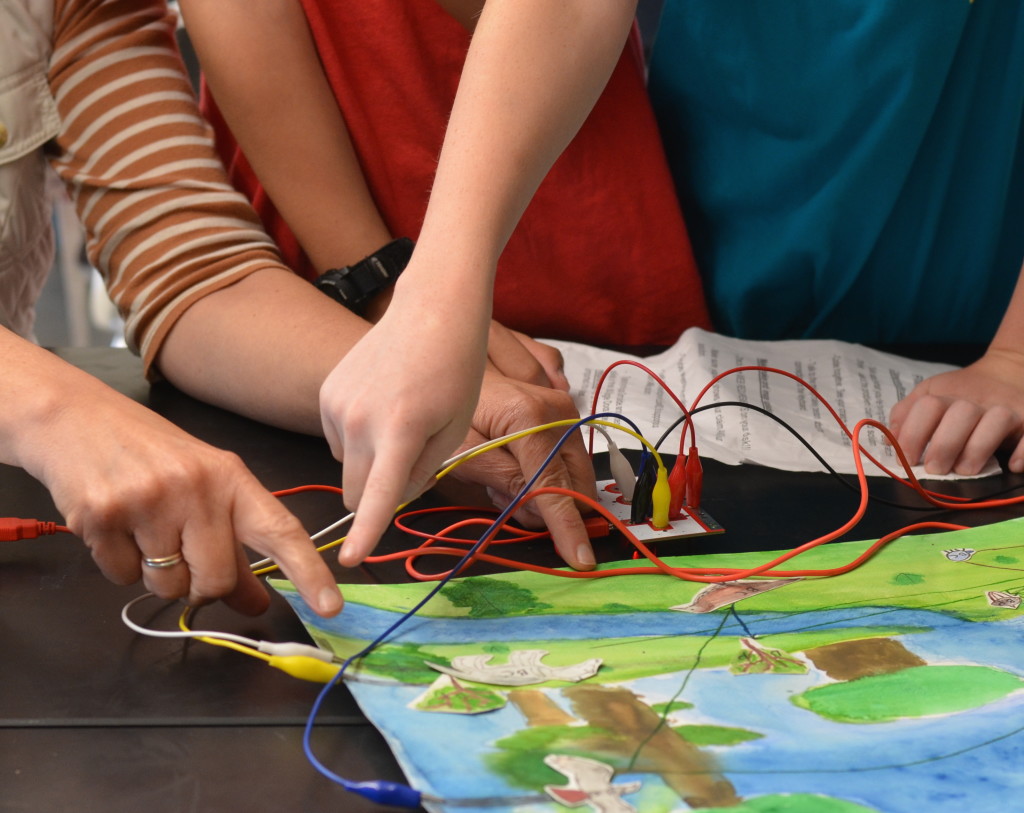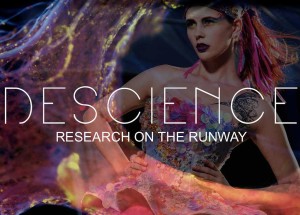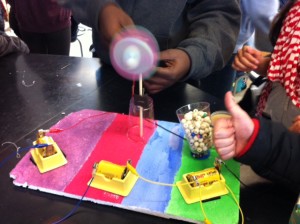The most recent report from the field about our work with CPS through the Department of Elementary & Secondary Education (DESE) Creativity/Innovation Grant. This article, written by CCC’s director, focuses on our role as a cultural partner using arts-based interdisciplinary learning to foster creativity. Click here to see the full article online at the DESE Contextual Learning Portal
INSIDE VIEW: CLASSROOMS THAT FOSTER CREATIVITY
PERSPECTIVES FROM A CULTURAL PARTNER
Posted by: Kyle Browne | Cambridge Creativity Commons | Lesley University
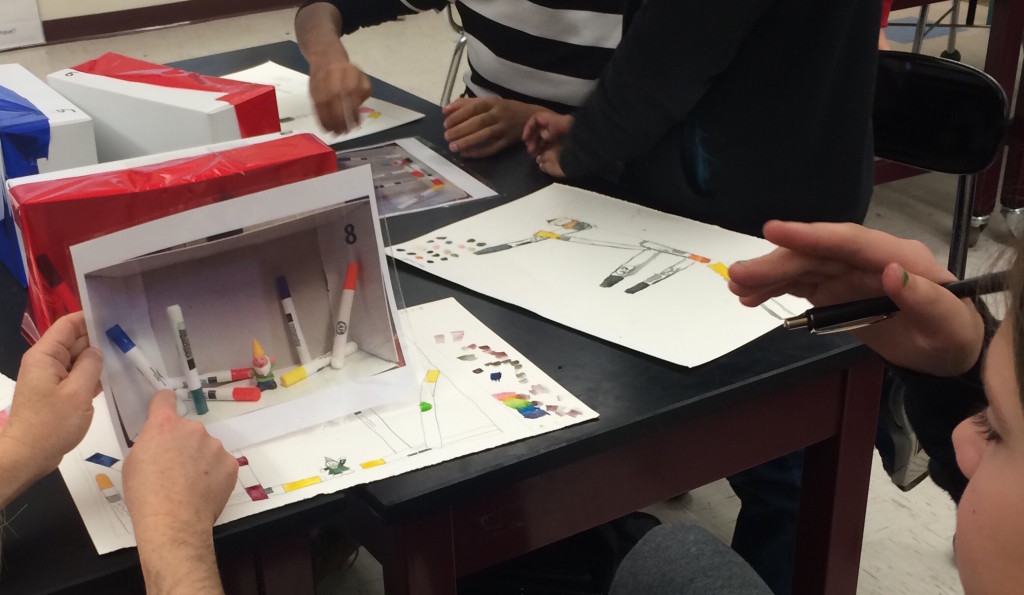
Light. Color. Observation. Nature. What are the topics and skills studied in science classes that invite cross-curriculum collaboration with technology and art? How can having an outside cultural partner help to open up these collaborations?
Interactive Ecosystems, a 6th grade project looking at relationships in forest ecosystems, came from such questions. The work began in 2014 with an initial collaboration between an instructional technology specialist, a 6th grade science teacher and myself, a teaching artist and director of the Cambridge Creativity Commons at Lesley University, three passionate educators wanting their students to have an engaging learning experience. We are in the second year of the Creativity/Innovation Grant, and Interactive Ecosystems is now being implemented across all five 6th grades in the Cambridge Public Schools (CPS).
As the cultural partner, the Cambridge Creativity Commons (CCC) is working with the CPS science department and collaborating closely with individual teachers. CCC’s mission is “to engage Cambridge Public School students and teachers in developing their imagination and creativity across disciplines to enrich aesthetic understanding and activate the joy of learning through innovative arts-based projects.” By working across disciplines and using the arts as a catalyst for learning, students are able to access the content in new ways.
As the sole teaching artist for Interactive Ecosystems, I am responsible for coordinating communication, collaborating with teachers in lesson development, providing training, and assisting with implementation of the arts-related lessons. As a result of our experience over the first two years, we realized it would be beneficial to separately address the art and technology skills before beginning Interactive Ecosystems. In this way, we could build sustainability and overcome time constraints, while also increasing the expertise and level of comfort of teachers and students using new art and technology skills. This year, we are conducting several skill-building sessions that not only prepare for Interactive Ecosystems, but also provide creative opportunities for other projects throughout the year.
At this writing we are in the midst of implementing these lessons; I am working across the district to engage teachers and students in observational drawing and watercolor painting as they simultaneously learn about the science concepts of color and light. These lessons are building students’ ability to observe closely as they learn to both trust and question what they see, and as they learn to use new materials to access science and art content in a unique, interdisciplinary way.
As a cultural partner, my role has been to identify and develop areas for cross-curricular collaboration that might not readily be available to teachers. As a trained artist and educator working in a cultural non-profit, I have the ability and time to uncover areas of connections among multiple subjects, and, in collaboration with teachers, develop curriculum that works at the intersections of these varying subjects. Through engaging, hands-on and integrated projects, students are gaining understanding of art, technology and science concepts. As a practicing artist I am able to share my expertise and experience, providing a new perspective for students and teachers. This connection to the real world enriches the classroom environment, and I constantly hear from teachers how beneficial and refreshing it is for them as well as their students.
Share your experiences! What are some of the natural connections you see among art, science, technology and other fields? How do you reshape curriculum to allow students, teachers, and partners to explore connections across disciplines?
Attached is a photo from the current project, Light & Color: Through the Eyes of an Artist.
Click here to see the full article online at the DESE Contextual Learning Portal
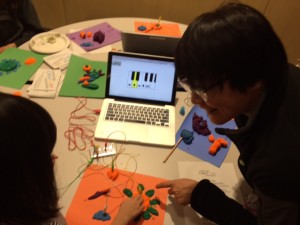 To kick off the year, the city-wide STEAM coordinator, Sharlene Yang, organized the first STEAM night Riverside, at the MLK School. CCC attended as a partner and offered the ever popular Makey Makey Musical Instruments. This activity pairs learning about sculpture, music, electrical currents and computer programming all in one! A diverse group of learners joined us from pre-K to 8th grade and their parents!
To kick off the year, the city-wide STEAM coordinator, Sharlene Yang, organized the first STEAM night Riverside, at the MLK School. CCC attended as a partner and offered the ever popular Makey Makey Musical Instruments. This activity pairs learning about sculpture, music, electrical currents and computer programming all in one! A diverse group of learners joined us from pre-K to 8th grade and their parents!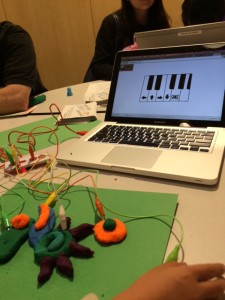
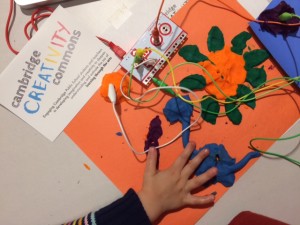
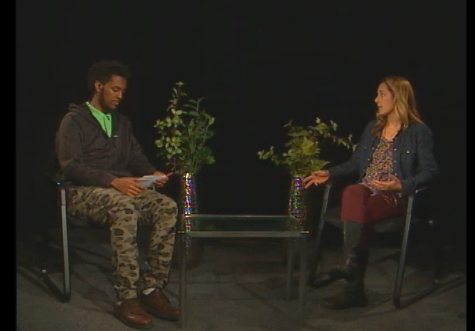 Cambridge Rindge & Latin students have an amazing opportunity to take classes and programs at the school’s Media Resource Center. One of the highlights is working out of a real TV studio and interviewing people that do interesting things in Cambridge. Watch their latest Spot On Interview with Kyle Browne, Director of Cambridge Creativity Commons
Cambridge Rindge & Latin students have an amazing opportunity to take classes and programs at the school’s Media Resource Center. One of the highlights is working out of a real TV studio and interviewing people that do interesting things in Cambridge. Watch their latest Spot On Interview with Kyle Browne, Director of Cambridge Creativity Commons 